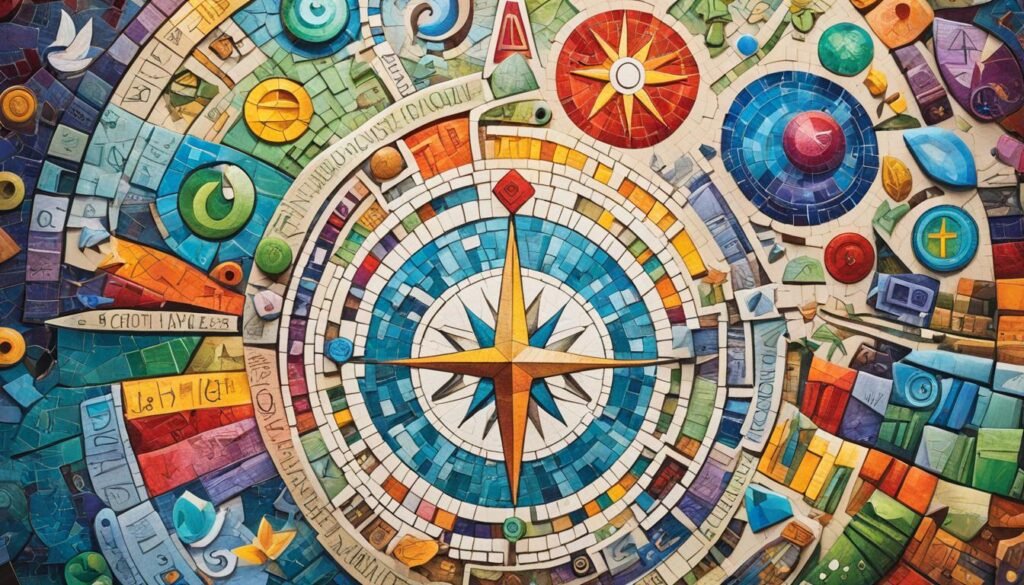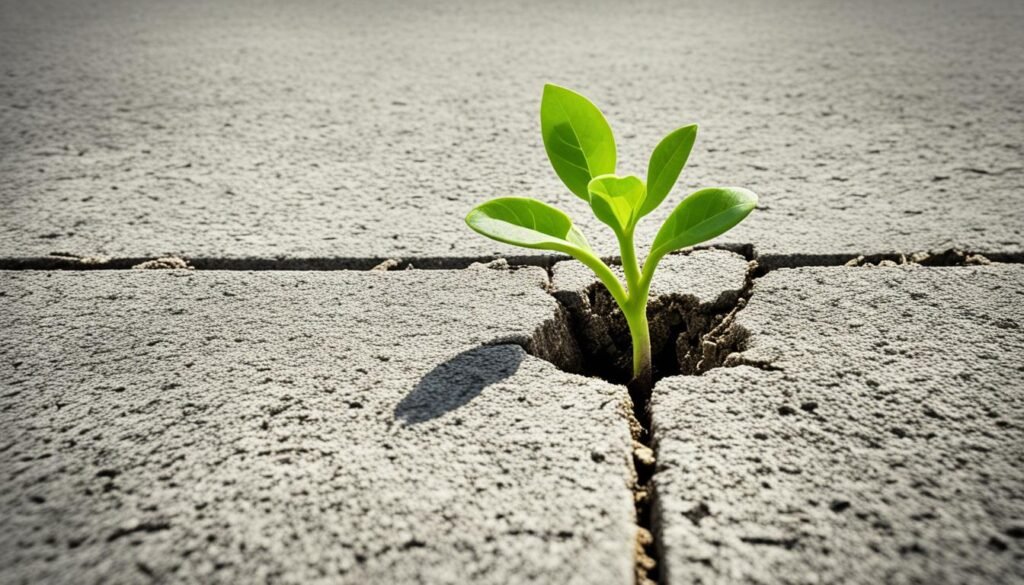This article will dive into 27 key life lessons that can change how you see things and lead you to a more fulfilling life. These lessons come from philosophers, authors, and real-life stories. They cover many topics, like growing personally, being resilient, and being thankful and aware of yourself.
By the end, you’ll feel more purposeful and ready to face life’s challenges with better clarity and confidence.
Table of Contents
Embrace Personal Growth
Personal growth is a lifelong journey. Embracing a growth mindset is key to your success. A growth mindset means you believe your abilities can grow through hard work and learning from mistakes. This is different from a fixed mindset, where people think their skills can’t change.
Having a growth mindset is vital for personal growth and self-improvement. When you face challenges, seeing them as chances to learn helps you grow. This mindset makes you more resilient and determined.
Learn from Your Mistakes
Mistakes are part of learning. Embracing them is key to personal growth. Instead of beating yourself up, learn from them. Think about what went wrong and how you can do better next time.
Seeing mistakes as feedback helps you understand yourself and the world better. This approach makes you more resilient and self-aware. It helps you tackle life’s challenges with confidence and flexibility.

“The greatest mistake you can make in life is to be continually fearing you will make one.” – Elbert Hubbard
| Characteristics of a Growth Mindset | Characteristics of a Fixed Mindset |
|---|---|
| Sees challenges as opportunities for learning and improvement | Avoids challenges, as they are seen as threats to one’s abilities |
| Embraces feedback and criticism as a means of growth | Defensive in the face of feedback and criticism |
| Persistently works to develop new skills and knowledge | Believes that abilities are set in stone, and doesn’t put in the effort to improve |
| Views mistakes as valuable learning experiences | Sees mistakes as failures that reflect a lack of talent or ability |
Practice Gratitude
Gratitude is a powerful tool for personal transformation. By focusing on what you’re thankful for, you can change your outlook and become more positive. Studies show that being grateful can improve your mental health, make you more resilient, and help you connect better with others.
Being grateful can really help your mental health. People who say thanks often feel less stressed and happier. It helps us think more about the good things in life.
Gratitude is also good for your body. Grateful people eat better and exercise more. This can make you less likely to get sick. Gratitude also makes you healthier by lowering inflammation and boosting your immune system.
Gratitude is key to strong relationships too. Saying thanks makes our connections with others stronger. This leads to more support and a sense of belonging, which are key for feeling good.
To add gratitude to your day, try writing in a gratitude journal. Or, take time to think about the good things and people in your life. Showing thanks to those who matter can change your life. By using gratitude, you open up a world of positive thinking and mindfulness. This leads to a happier, more fulfilling life.
“Gratitude is not only the greatest of virtues, but the parent of all the others.” – Cicero

Life Lessons: Discover Your Passion
Finding your passion and living with a clear purpose changes everything. It’s about chasing your dreams and finding joy in your work, even when it’s hard. It’s also about finding a good balance between work and life for happiness and contentment.
Pursue Your Dreams
Going after your dreams takes courage and can lead to amazing growth and happiness. You might face risks and challenges, but the rewards are worth it. Start by knowing what you’re passionate about, set goals, and work hard to make your dreams come true.
Find Purpose in Your Work
Working towards your dreams and finding purpose in your job makes you feel fulfilled. When your job matches your values and interests, you feel more motivated. Look for ways to bring your passion into your job, like changing careers, starting a business, or adding creativity to your current role.
| Passion | Purpose | Dreams |
|---|---|---|
| Discover what ignites your passion and brings you joy. | Identify how you can use your purpose to make a positive impact. | Visualize your dreams and create a plan to make them a reality. |
“The only way to do great work is to love what you do. If you haven’t found it yet, keep looking. Don’t settle.” – Steve Jobs
Finding your passion and purpose is a journey that never ends. Be patient, keep exploring, and learn from every experience. Living in line with your dreams and values brings deep fulfillment and a good work-life balance.
Nurture Relationships
Meaningful relationships are key to a happy life. They help us feel like we belong and give us emotional support. Growing these relationships is important for our happiness and well-being.
Value Family and Friends
Family and friends support us in many ways. They offer a place where we can be ourselves and share our feelings. Spending time with them strengthens our emotional bonds.
Sharing quality time with loved ones boosts our emotional health. Activities like weekly dinners, monthly meet-ups, or spontaneous outings help us feel connected. These moments are good for our social connections and sense of belonging.
Being in relationships also helps us grow personally. We learn new things and gain new views on life. Talking and working together improves our communication and emotional smarts, leading to better relationships.
“The most beautiful and profound emotion we can experience is the sensation of the mystical. It is the sower of all true science. He to whom this emotion is a stranger, who can no longer wonder and stand rapt in awe, is as good as dead.” – Albert Einstein
Life can be tough, but having strong family and friend support helps. By focusing on these relationships, we live a full and joyful life. We get to enjoy connections, laughter, and shared moments.
Develop Resilience
Resilience is the ability to bounce back from tough times. It’s a key life skill that helps us deal with challenges. By being resilient, we can adapt, overcome obstacles, and grow personally.
Building resilience starts with changing how we think. Instead of seeing challenges as huge problems, we can see them as chances to learn and get better. This mindset helps us be adaptable and find new ways to solve problems.
Practicing self-care is also important for resilience. Taking care of our physical and emotional health helps us handle life’s stresses better. Doing things that are good for our mind, body, and spirit keeps us strong and balanced, even when things get hard.
| Strategies for Building Resilience | Benefits |
|---|---|
| Cultivating a problem-solving mindset | Increased adaptability and ability to overcome obstacles |
| Practicing self-care | Improved emotional and physical well-being, better stress management |
| Seeking support from friends, family, and community | Enhanced sense of belonging, access to resources and encouragement |
Getting support from friends, family, and community is also key to resilience. Being around people who care about us gives us resources, encouragement, and a sense of belonging.
“Resilience is not about bouncing back, but about bouncing forward. It’s about using adversity as a springboard for personal growth and positive change.”
As we go through life’s ups and downs, building resilience can change us. By solving problems, taking care of ourselves, and having a supportive network, we can not only get through tough times but also come out stronger, wiser, and more adaptable.
Embrace Mindfulness
In today’s fast-paced world, it’s easy to get overwhelmed by tasks and stress. But mindfulness can help. It teaches us to live in the present moment and be more aware. This can bring us peace, clarity, and resilience.
Live in the Present Moment
Mindfulness is about being fully present. It means not thinking about the past or worrying about the future. When we focus on now, life feels more vivid and enjoyable. This can reduce stress, improve focus, and deepen our connection with ourselves and others.
Practice Meditation
Meditation is key to mindfulness. It involves quieting the mind and focusing on the breath. This helps us notice our thoughts, feelings, and body more clearly. Regular meditation can manage stress, boost mental well-being, and bring us closer to ourselves.
Starting with mindfulness can change your life. Living in the present moment and meditating can help you face life’s challenges with clarity and purpose.
“Mindfulness is simply being aware of what is happening right now without wishing it were different; enjoying the pleasant without holding on when it changes (which it will); being with the unpleasant without fearing it will always be this way (which it won’t).” – James Baraz
Seek Wisdom from Experiences
Life is full of ups and downs, each moment teaching us something new. It’s key to see each experience as a chance for wisdom and personal growth. The real value of our experiences comes from the lessons we learn from them.
Learn from Your Failures
Success is great, but our failures teach us the most. When we fall, it’s normal to feel down. But these moments let us reflect, learn from our mistakes, and grow stronger.
Seeing our failures as chances to learn opens up new insights. Every setback can lead to personal growth. It helps us understand ourselves better and what we need to work on. By learning from these times, we become more resilient and purposeful.
As we go through life, let’s see every experience as a way to gain wisdom. By facing our failures and learning from them, we open the door to personal growth. This helps us understand ourselves and the world better.
Cultivate Self-Awareness
Self-awareness is a journey that can change your life. It helps you understand your thoughts, feelings, strengths, and weaknesses. This knowledge lets you make better choices, improve your relationships, and face challenges with clear goals.
Starting with self-reflection is key to gaining self-awareness. Take time to think deeply about your beliefs, values, and what drives you. Think about your past, both good and bad times, and how they’ve shaped you. This self-examination can reveal important insights, helping you grow and reach your goals.
Being emotionally intelligent is also vital for self-awareness. It means paying attention to your feelings and using them wisely. This can make you a better decision-maker, problem-solver, and overall happier person. You’ll handle life’s ups and downs with more maturity and strength.